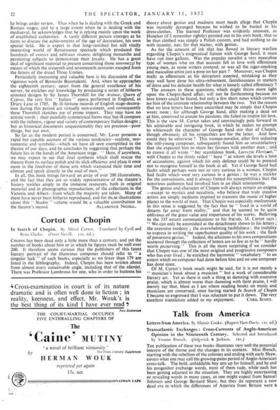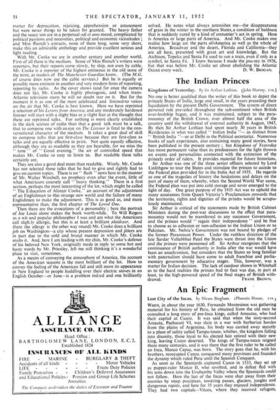Talk from America
Letters from America. By Alistair Cooke. (Rupert Hart-Davis. i 21. 6C1.) THE publication of these two books illustrates very well the perennial interest of the theme and the changes in its content. Miss ffrench, starting with the rebellion of the colonies and ending with early Shaw, covers what one may call the growing-pains period of Anglo-American cross-talk. The bold, unbiddable boy sets up for himself, and he and his progenitor exchange words, most of them rude, while-each has been getting adjusted to the situation. They are highly entertaining or revealing words in many cases, as one might expect from Samuel Johnson and George Bernard Shaw, but they do represent a now dead era in which the differences of America from Britain were a matter for deprecation, rejoicing, apprehension or amusement but were never things to be taken for granted. The heavy father and the saucy son are in a perpetual odi et amo mood, complicated by political passions and necessities, political and economic vicissitudes ; and Miss ffrench's extracts, none of them long, some very .short, make this an admirable anthology and provide excellent serious and light reading.
With Mr. Cooke we are in another century and another world. First of all there is the medium. Some of Miss ffrench's writers were reporters, but their reports came slowly, by ship, not even by cable. Mr. Cooke is a reporter of the highest eminence in the old sense of the term, as readers of The Manchester Guardian know. (The M. G. of course does now use the cable services.) But he is equally or possibly more eminent in another and very modern form of reporting, reporting by radio. As the cover shows (and for once the camera does not lie), Mr. Cooke is highly photogenic, and when trans- Atlantic television starts he will no doubt star on it. But for the moment it is as one of the most celebrated and listened-to voices on the air that Mt. Cooke is best known. Here we have reprinted a selection of his Letters from America, and any moderately hardened listener will start with a slight bias or a slight fear at the thought that these are reprinted talks. For nothing is more clearly established in the dark science of radio than that a good talk must be a talk, that to compose one with an eye on The Listener is fatal to thecon- versational character of the medium. It takes a great deal of skill to compose talks that are first-class because they are first-class as talks and are equally effective in print. Not quite equally effective, although they are as readable as they are bearable, for we miss the " tone " of "Good evening," the air of controlled speed that makes Mr. Cooke so easy to listen to. But readable these talks certainly are.
They are also a good deal more than readable. Wisely, Mr. Cooke has not selected those talks that he had to give and rightly had to give on current topics. There is no" flash "news here in the manner of Mr. Walter Winchell, no prophecy even after the event, little of what Americans coarsely call " heavy thinking." There is a first section, perhaps the most interesting of the lot, which might be called "The Education of Alistair Cooke," an account of the adjustment of an Englishman to this strange new world and the failure of many Englishmen to make the adjustment. This is as good as, and more representative than, the first chapter of The Loved One.
Then there are the evocations of a personality ; here the portrait of Joe Louis alone makes the book worth-while. To Will Rogers as a wit and popular philosopher I was and am what the Americans call slightly allergic, but this is at least a brilliant plaidoyer. And (here the allet gy is the other way round) Mr. Cooke does a brilliant job on Washington—a city whose present depression and jitters are in part due to the cold and brutal manner in which Mr. Cooke snubs it. And, here I am leading with my chin, Mr. Cooke's defence of his beloved New York, originally made in reply to some hot and hasty words by Mr. Priestley, left me still thinking it's a wonderful place to visit, sometimes.
As a means of conveying the atmosphere of America, the account of the Ametican seasons is the most brilliant of the lot. How to convey the feeling of the American fall and still more its appearance in New England to people huddling over their electric stoves in an English October—or June—is a problem indeed and one brilliantly solved. He notes what always astonishes me—the disappearance of grass in the winter in the northern States, a condition of baldness that is suddenly cured by a kind of costumier 's act in spring. Here is America or large parts of America. And Mr. Cooke makes one realise how large are the parts of*America as well as the whole of America. Broadway and the desert, Florida and California—they are all here, presented with great art and knowledge. But the Atchison, Topeka and Santa Fe used to tun a train, even if only as a symbol, to Santa Fe. I know because I made the jouiney in 1926, but that was before Mr. Cooke set about abolishing the Atlantic



































 Previous page
Previous page